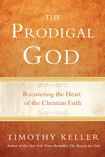Timothy Keller: The Prodigal God
 Timothy Keller, The Prodigal God: Recovering the Heart of the Christian Faith (Dutton Adult, 2008), 160 pages, ISBN 9780525950790.
Timothy Keller, The Prodigal God: Recovering the Heart of the Christian Faith (Dutton Adult, 2008), 160 pages, ISBN 9780525950790.
The Prodigal God is based on the passage of Scripture we typically call the Parable of the Prodigal Son that is found in chapter 15 of Luke’s gospel; this book is largely an exposition of that scriptural passage. The book’s title may at first sound strange because we usually view the younger son in the story as the prodigal because he is wayward. Keller, citing Merriam-Webster’s Collegiate Dictionary, says that the word “prodigal” means “recklessly spendthrift,” which he says means to “spend until you have nothing left.” That is what the father in the story did for his two sons (and the father symbolizes God). He gave of his wealth and reputation as he reached out to his two sons. Thus, God is prodigal, sparing no expense. Keller’s exposition of this parable is both insightful and inspiring. Anyone interested in gaining, or growing, in an understanding of grace will benefit from reading this book.
The author suggests that this parable might more accurately be called the parable of The Two Lost Sons. One of the lost sons left his father’s home and the other one stayed there. However, both of the sons, in their own ways, were estranged from their father. Keller examines the life of each son and their particular issues. He says that the sons represent two different kinds of people and how they relate to God. Those, who are like the younger son, are very obviously in rebellion against God, their lifestyle makes it very clear as they live in obvious sin. Others, like the older brother, look moral and upright, but are inwardly at odds with God (in the parable this eventually comes out). The second group symbolizes self-righteous religious persons. Though the sons related differently to their father they were both alienated from him. Keller says that they both resented their father’s authority, they both wanted to tell him what to do, and they both served or related to their father for selfish reasons, for what was in it for them. The point is that both sin and moral goodness can keep a person from God. Keller says that the gospel message is in essence, “everyone is wrong, everyone is loved, and everyone is called to recognize this and change.” In addition to writing about how the sons each related to their father the author also writes some about the relationship between the two sons. In particular, how the older son related or perhaps better said, did not relate to the younger son. Keller also points out that the story did not end the same for both of the sons. As the parable closes, the younger, worldly son is reconciled to his father and the older, moral son is not. The author points out that in context that is exactly Jesus’ point. At the beginning of Luke chapter fifteen there were some Pharisees and teachers of the law who were grumbling that Jesus welcomed sinners and ate with them (Luke 15:2). The Pharisee’s represented the older brother and the tax collectors and sinners represented the younger brother.
Category: Biblical Studies, Pneuma Review, Winter 2010


